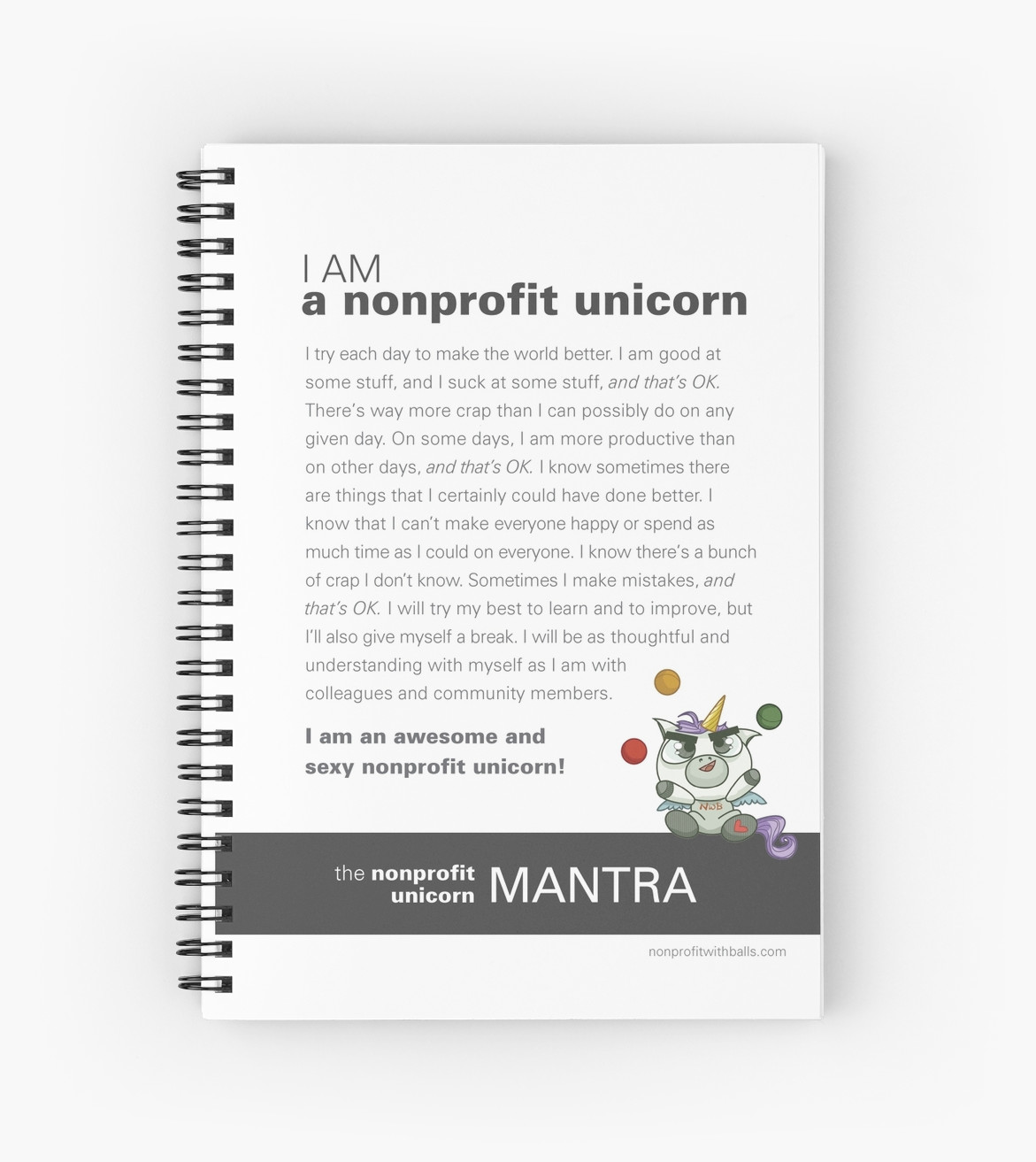 Hi everyone. Before we begin today’s post, new NWB merchandise! The Nonprofit Unicorn Mantra line of products! Also, I got comments from non-nonprofit readers who felt left out, so here is some “I am a social justice unicorn” merchandise.
Hi everyone. Before we begin today’s post, new NWB merchandise! The Nonprofit Unicorn Mantra line of products! Also, I got comments from non-nonprofit readers who felt left out, so here is some “I am a social justice unicorn” merchandise.
***
This week, my awesome smart audio speaker arrived. It’s really cool. I can use my voice to ask it to play music, forecast the weather, read news headlines, set the timer, add things to my calendar, and—with other devices linked to it—control the lights and other appliances in the house. Her name is Alexa, and she’s a lifesaver when I have a newborn screaming in my ears and a three-year-old dangling from my leg. Alexa also spouts pick-up lines upon request, although “Hey girl. Are you a high chair? Because I want to put a baby in you” did nothing to calm the children down.
Why do I bring this up? Because I am amazed and grateful for all the incredible stuff people come up with. I appreciate inventors and manufacturers and retailers and am happy to pay money for useful gadgets that make my life easier. For-profits are critical to society, and we nonprofit folks understand that. I don’t know a single nonprofit that makes vodka.
But it often does not seem that the appreciation is mutual. A few months ago, I wrote “Hey, you want nonprofits to act like businesses, then treat us like businesses.” The post resonated with nonprofit folks, who shared it over 25,000 times on social media. And of course, it incurred the irritation and bizsplaining from for-profit folks. Here are some actual comments:
“It’s not that you want to be treated EQUALLY, it’s that you want to be treated like you’re SPECIAL. No one cares that you want to save the world. We all want to save the world. You need to show that you have the business acumen to carry it forward — regardless of if you are a nonprofit or for profit.”
“I’ve seen non-profits with obscene amounts of money being wasted on flying people around, investing in the wrong projects[,] and organizing PR campaigns to look good in front of the donors. I’ve seen people making salaries way above what any reasonable business would pay for the amount of work they do and their skill-set.”
“So, you do not offer any products? You ask for donations, kind of like charity. I do not care what they do at Toys-R-Us because they have investors to answer to, if I am donating to a charity. I am the investor. Do not blame us for researching non-profits that use more money on programming and less on paying staff.” 
Those are enough to make me shout “Alexa, play Boulevard of Broken Dreams by Green Day” while a single tear rolls poetically down my cheek. But it’s the comments like the following that are most concerning:
“A VC won’t sink millions into ‘complex social problems’ because he won’t DIRECTLY get anything back — even if the social problems are solved.”
“When we invest in for-profits we do so for the potential of realizing more value (thicker wallet) to us as individuals. When we donate money to Non profits we give our money with no hope of self gain. Therefore those of us who give our hard earned money have every right to judge a non profit any way we want, take as much time as we want to fund our decision, expect overhead to be as low as possible, expect that our donation does not go to an over paid CEO, that the gift will make a difference in the long haul, [etc.]”
Sigh. All right, for-profit folks, we need to have a talk. Some of you don’t seem to believe that you gain anything by supporting nonprofits. You do it out of the goodness of your own heart, like the kind, generous people that you are. When you buy a roll of toilet paper or some chocolate or subscribe to Netflix, clearly you benefit, but when you donate to a nonprofit that helps the homeless, why, that’s just you helping those poor, down-trodden families out of the goodness of your own heart, expecting nothing in return, because you’re kind and generous.
I know I’m being snarky, mainly because I just watched the latest episode of Game of Thrones and yet another good character gets killed. There are tons of awesome for-profit people who are not condescending and paternalistic (thank you!). But this philosophy of “we don’t benefit directly from the work of nonprofits” seems to be prevalent in our society, and it’s been leading to no-good, very-bad things like restricted funding and fear of overhead and unwillingness to pay for nonprofit professionals’ salaries.
Well, let me tell you something, my for-profit friends. Just because you can’t hold or see something does not mean you do not benefit from it. All of us benefit more from nonprofits’ work than we’ll ever know. If you feel safe walking down the street, it’s probably because there are nonprofits working on neighborhood safety and providing services to those who need help. If you appreciate all the free art and music all around you, it’s probably because there are nonprofits supporting kick-ass artists and musicians in the community. If you like parks and clean air, it’s probably because there are nonprofits focused on making sure there are green spaces and recycling and clean transportation. If you like organic food, there’s probably a bunch of nonprofits fighting hard for policies around labeling and GMO.
 I could go on. In fact, I will. If you or anyone you love have a serious illness, there’s probably a nonprofit working hard to find the cure. If you love someone of a different race or the same sex or gender, there have been and still are nonprofits fighting for your rights to be in the same room or use the same water fountains. If you have a company and you hire people, you probably benefited from nonprofits’ work because many of us support young people to graduate from school and to reach their potential. If you’re happy that your favorite political candidate got elected, there were probably nonprofits educating people about voting and other civic duties. If you love to travel, there are NGOs working to remove landmines and preserve historical sites and otherwise make your trips enjoyable or even possible. If you or your kids enjoy learning about animals or dinosaurs or airplanes or history, keep in mind that zoos and museums are nonprofits. If you go to a dentist or a mechanic, they may have learned a thing or two in our after-school, or sports, or mentorship programs and that may have contributed in some part to their success.
I could go on. In fact, I will. If you or anyone you love have a serious illness, there’s probably a nonprofit working hard to find the cure. If you love someone of a different race or the same sex or gender, there have been and still are nonprofits fighting for your rights to be in the same room or use the same water fountains. If you have a company and you hire people, you probably benefited from nonprofits’ work because many of us support young people to graduate from school and to reach their potential. If you’re happy that your favorite political candidate got elected, there were probably nonprofits educating people about voting and other civic duties. If you love to travel, there are NGOs working to remove landmines and preserve historical sites and otherwise make your trips enjoyable or even possible. If you or your kids enjoy learning about animals or dinosaurs or airplanes or history, keep in mind that zoos and museums are nonprofits. If you go to a dentist or a mechanic, they may have learned a thing or two in our after-school, or sports, or mentorship programs and that may have contributed in some part to their success.
Heck, if you haven’t stepped in any gum lately, it may be because some of us are helping teach kids about littering.
The challenge is that nonprofit work is often like air: people take it for granted because we do not see it and we don’t take much time to think about it until it is no longer there. You don’t think you’ll lose your job and your home, so you don’t appreciate the nonprofits that provide employment services, or that build low-income housing, or that run food banks. You don’t think your parents will ever age and feel lonely, so you don’t appreciate the senior centers. You don’t think you’ll end up with a disability, so you don’t appreciate the nonprofits that work tirelessly to make sure buildings are accessible. You don’t think your kids will ever get bullied, so you don’t appreciate the nonprofits working to end bullying. You don’t think you’ll lose a loved one, and so you don’t appreciate the nonprofits that do grief counseling. You don’t think you’ll be wrongly convicted of a crime and jailed, so you don’t appreciate the nonprofits working to prove people’s innocence.
It is human nature to take things for granted. Nonprofit work is like air, and for-profit stuff seems more like food: You can touch food, and smell it, and taste it. It’s in your face. There are “foodies,” but no one ever claims to be an “airie.” But guess what, you benefit plenty from air, just as you benefit from the work that we nonprofits do each day, and you may not even realize it. Yes, not all of us are perfect; there are irresponsible nonprofits, just like there are irresponsible for-profits. If you look down on nonprofits, think about what kind of society we would have if we didn’t have nonprofits taking care of the above challenges, and ask yourself if you want you or your kids to live in that world.
Now that I have kids, I have an even deeper appreciation for all of my colleagues in the field. When I donate whatever amount of money or time that I can to a nonprofit, I don’t think of it as charity or compassion. I don’t think, “They should be grateful for this.” I am grateful because these organizations are working each day to build the kind of community—the kind of safe, beautiful, just world—that I want my kids to grow up in.
We live in a community together, and we each have our roles to play to make this whole thing work. Both food and air are necessary for survival. And both for-profits and nonprofits, as well as government, are critical to a well-functioning society. For-profits do awesome stuff, such as create episodes of Game of Thrones as well as the TVs on which I can watch them, along with the beer I need to imbibe to get through one more favorite character’s death or imprisonment. We do not take for granted what businesses add to the world. Please return the favor. Because until you can say, “Alexa, make the world safe, beautiful, and just,” you’re going to need us nonprofits.
—
Make Mondays suck a little less. Get a notice each Monday morning when a new post arrives. Subscribe to NWB by scrolling to the top right of this page and enter in your email address. Also, join the NWB Facebook community for daily hilarity.
Also, join Nonprofit Happy Hour, a peer support group on Facebook, and if you are an ED/CEO, join ED Happy Hour. These are great forums for when you have a problem and want to get advice from colleagues, or you just want to share pictures of unicorns. Check them out.
Discover more from Nonprofit AF
Subscribe to get the latest posts sent to your email.

